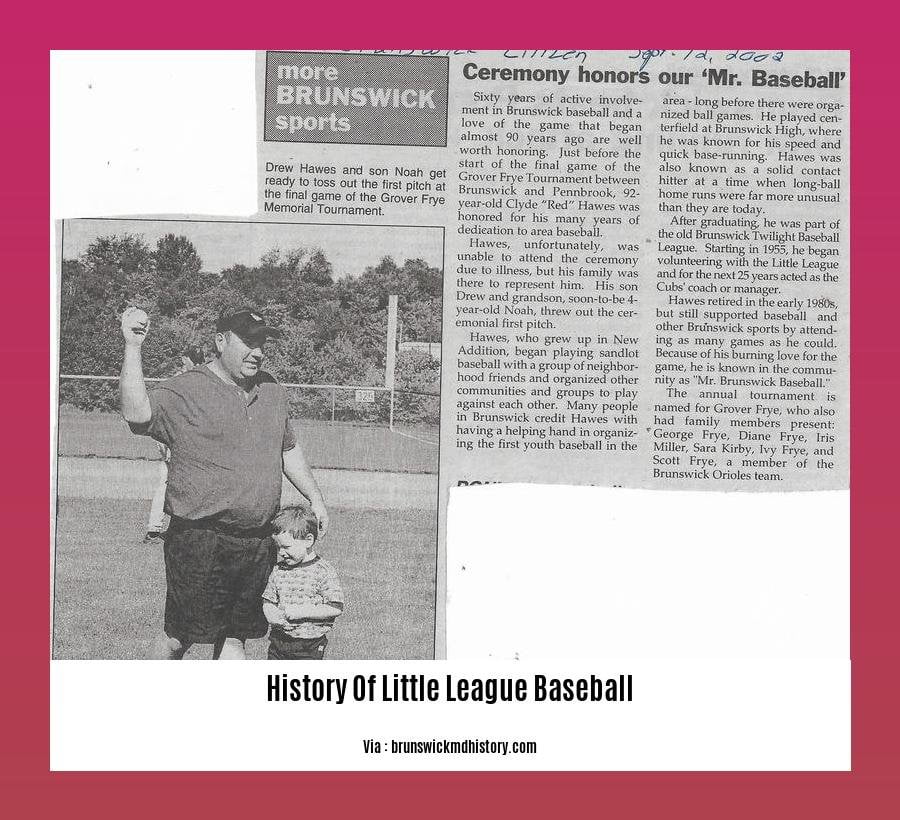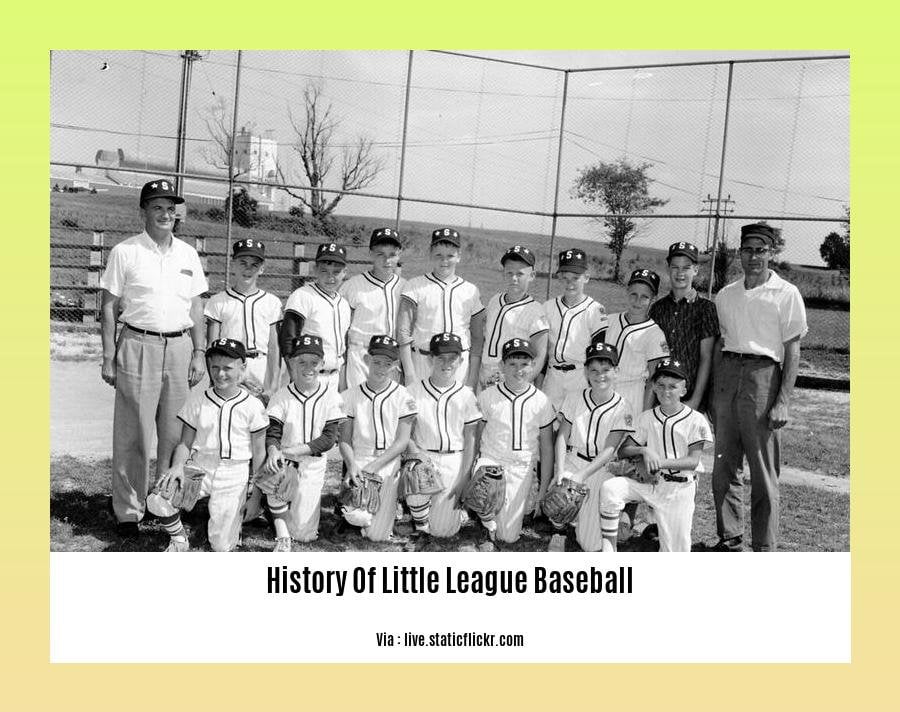Embark on an inspiring journey through time as we delve into the rich history of Little League Baseball in “[A Century of Dreams: Uncovering the History of Little League Baseball].” From humble beginnings in Williamsport, Pennsylvania, to becoming a global phenomenon, Little League has left an indelible mark on the world of sports and the lives of millions of young athletes. Get ready to relive iconic moments, meet legendary players, and discover how this remarkable organization has shaped the game of baseball and the dreams of countless children for over a century.
Key Takeaways:
Little League Baseball and Softball was founded in 1939 by Carl E. Stotz.
It began as a small project involving Mr. Stotz and his nephews.
The first official season in 1939 had just three teams.
The inaugural Little League Baseball World Series was held in 1947 in Williamsport, Pennsylvania.
Little League has grown to include over 180,000 teams in 80 countries.
The organization promotes teamwork, sportsmanship, and healthy competition.
Little League offers various divisions for different age groups, including Challenger Baseball and Softball for children with challenges.
Player development, skill acquisition, and character-building are emphasized through Little League programs and events.
History of Little League Baseball

Little League Baseball is a global phenomenon that gives millions of children the chance to learn teamwork, sportsmanship, and the love of the game. But how did this youth sports powerhouse come to be? Let’s journey through the history of Little League Baseball and discover how it all began.
How It All Began
In 1939, Carl Stotz, an oil company clerk from Williamsport, Pennsylvania, had a vision to create a structured baseball program for his nephews and their friends. With limited funding, they started with just three teams, playing informal games on a makeshift field.
The history of Little League Baseball officially began that year, with simple rules and a focus on fun and skill development. Carl’s dedication and the overwhelming support from the community laid the foundation for what would become a global phenomenon.
Little League’s Early Growth
The early years of Little League Baseball were marked by steady growth and increasing popularity. In 1947, the inaugural Little League World Series was held in Williamsport, Pennsylvania, with 12 teams competing for the championship.
The tournament quickly gained national attention, showcasing the talent and sportsmanship of these young athletes. By the 1950s, Little League had expanded beyond the United States, with teams from Canada, Mexico, and Venezuela joining the World Series.
A Global Phenomenon
In the decades that followed, Little League Baseball continued to spread across the globe, reaching over 80 countries and becoming the world’s largest organized youth sports program.
The Little League World Series became an annual tradition, attracting millions of fans worldwide. The tournament provides a platform for young players to showcase their skills and represent their countries on the global stage.
The Impact of Little League
The history of Little League Baseball is not just about the game itself; it’s about the impact it has had on the lives of millions of children around the world.
Little League teaches children the importance of teamwork, sportsmanship, and discipline. It provides a safe and structured environment for kids to learn and grow, both on and off the field.
Through Little League, children develop a love for the game of baseball and make lifelong memories. The friendships and lessons learned on the field stay with them long after they hang up their cleats.
Little League Today
Today, Little League Baseball continues to thrive, with over 180,000 teams and millions of players worldwide. The organization remains committed to providing a positive and enriching experience for children of all abilities, backgrounds, and cultures.
From humble beginnings in Williamsport, Pennsylvania, to a global movement that inspires millions, the history of Little League Baseball is a story of passion, dedication, and the power of sports to bring people together.
Ever heard about the history of light switches? Ever wonder why people wear long hair or how macrame came to be? Click the links below to discover the history of all these things!
- Curious to know the history of light switches? Read more about it here.
- Want to know the history behind long hair and how it became a fashion statement? Click here.
- Interested in finding out the history of macrame and its roots? Head here.
Cultural Impact and Legacy
Little League Baseball, with its modest beginnings in Williamsport, Pennsylvania, has grown into a global phenomenon that transcends athleticism. Over the decades, it has left an indelible mark on the cultural landscape, igniting a passion for baseball in young hearts worldwide.
Little League’s impact is deeply rooted in its ability to foster a love for the game. The organization’s emphasis on teamwork, sportsmanship, and character development has shaped generations of players, instilling in them values that extend far beyond the diamond. The Little League World Series (LLWS), the pinnacle event of the Little League calendar, embodies this spirit, showcasing the extraordinary talents of young athletes and capturing the attention of millions.
The LLWS has evolved into a cultural phenomenon, captivating audiences with its heartwarming stories of perseverance, camaraderie, and triumph. The tournament has produced legendary moments that have etched themselves into the annals of baseball history, becoming a shared experience that transcends borders and unites fans across the globe.
Beyond its athletic achievements, Little League has played a pivotal role in promoting diversity and inclusion in sports. By providing a platform for young players from all backgrounds to compete on a level playing field, Little League has helped break down barriers and create a more inclusive environment in baseball.
The organization’s commitment to providing a safe and positive environment for children has also had a profound impact on communities worldwide. Little League fields have become gathering places, where families, friends, and neighbors come together to cheer on their local teams, fostering a sense of community and belonging.
Key Takeaways:
Little League Baseball has nurtured a love for baseball in young players worldwide, igniting a passion that often lasts a lifetime.
The Little League World Series has become a cultural phenomenon, captivating audiences with its heartwarming stories and unforgettable moments.
Little League has been instrumental in promoting diversity and inclusion in baseball, creating a more level playing field for young athletes from all backgrounds.
Little League’s commitment to providing a safe and positive environment has fostered a sense of community and belonging, bringing families and neighbors together through the shared experience of baseball.
Sources:
History of Little League Baseball
Little League World Series
Challenges and Controversies: Navigating the Complexities of Little League Baseball

Little League Baseball, a beacon of youth sports since 1939, has faced its fair share of challenges and controversies that have tested its integrity and reputation. While the organization remains deeply committed to providing a positive and enriching experience for young players, these controversies have sparked important conversations and prompted Little League to continually strive for improvement.
Controversies Surrounding the Little League World Series
The Little League World Series, the pinnacle of youth baseball, has been marred by a series of scandals that have shaken the foundation of the organization. The most infamous incident occurred in 2014 when Jackie Robinson West Little League was stripped of its title due to age and residency violations. This incident exposed the vulnerability of the system to cheating and raised questions about the integrity of the competition.
Another controversy emerged in 2001 when Curacao was stripped of its title due to ineligible players, and in 1997, Venezuela faced a similar fate due to using an ineligible player. These incidents highlighted the need for stricter player eligibility rules and underscored the importance of fair play in youth sports.
Addressing the Challenges
In response to these controversies, Little League has taken proactive steps to address the issues and prevent similar incidents from occurring in the future. The organization has implemented stricter player eligibility rules, enhanced background checks for coaches and team officials, and established a more rigorous oversight process for tournament selection.
Little League has also emphasized the importance of sportsmanship and ethical behavior, promoting a culture of integrity and respect among players, coaches, and parents. The organization has introduced educational programs and workshops to instill the values of fair play, teamwork, and respect for opponents.
Key Takeaways:
Little League Baseball has faced controversies related to player eligibility and residency violations in the Little League World Series.
The Jackie Robinson West scandal in 2014 brought national attention to the issue of cheating in youth sports.
Little League has responded to these controversies by implementing stricter player eligibility rules, enhancing background checks, and promoting ethical behavior.
The organization remains committed to providing a positive and enriching experience for young players while upholding the values of sportsmanship and fair play.
Citation
Little League Today and Future Prospects
Since its inception in 1939, Little League Baseball has become a global phenomenon, reaching far beyond the borders of Williamsport, Pennsylvania, its birthplace. With millions of players and teams across 80 countries, Little League has had a profound impact on youth sports, leaving a lasting legacy that continues to shape the future of baseball.
The Enduring Legacy of Little League Baseball
Little League Baseball’s enduring legacy lies in its ability to promote positive values such as teamwork, sportsmanship, fair play, and respect. Through its emphasis on character development and creating a safe and inclusive environment for children, Little League has become a cornerstone of youth sports, fostering lifelong lessons that extend beyond the baseball field.
Little League’s Global Reach: Fostering Cultural Exchange
Little League’s global reach has fostered cultural exchange and understanding among young players from different countries. The Little League World Series, a pinnacle event in the baseball calendar, brings together teams from across the globe, showcasing the diversity of cultures and celebrating the shared love for the sport.
Embracing Diversity and Inclusion
In recent years, Little League has made significant strides in promoting diversity and inclusion. The organization has actively worked to break down barriers and create opportunities for children from all backgrounds to participate in the sport. By embracing diversity, Little League has enriched the game and created a more welcoming and inclusive environment for all.
The Future of Little League Baseball: Innovation and Growth
As Little League Baseball looks to the future, innovation and growth are at the forefront. The organization is exploring new ways to engage with young players and families, leveraging technology to enhance the Little League experience. By embracing innovation, Little League is poised to continue its growth and reach new heights.
Little League World Series Expansion: A New Chapter
In 2021, Little League announced the expansion of the Little League World Series, increasing the number of teams participating in the tournament. This expansion reflects the growing popularity of the event and provides more opportunities for teams from around the world to showcase their skills on a global stage.
Key Takeaways:
- Little League Baseball has become a global phenomenon, reaching over 80 countries and millions of players.
- The organization’s emphasis on teamwork, sportsmanship, and character development has left a lasting legacy in youth sports.
- Little League’s global reach has fostered cultural exchange and understanding among young players from different countries.
- The organization’s commitment to diversity and inclusion has created a more welcoming and inclusive environment for all.
- Innovation and growth are at the forefront of Little League’s future, with the organization exploring new ways to engage with players and families.
- The expansion of the Little League World Series reflects the growing popularity of the event and provides more opportunities for teams to participate.
Relevant Sources:
- Little League Baseball and Softball – Official Site
- Little League World Series – ESPN
FAQ
Q1: What was the inspiration behind the creation of Little League Baseball?
A1: Little League Baseball was founded in 1939 by Carl E. Stotz, an oil company clerk from Williamsport, Pennsylvania. Inspired by the positive impact of organized sports on his nephews, Jimmy and Major Gehron, Stotz envisioned a structured and inclusive baseball program for the local youth.
Q2: How did Little League Baseball evolve from a local initiative to a global phenomenon?
A2: From its humble beginnings with three teams in 1939, Little League Baseball has grown exponentially over the decades. The establishment of the Little League World Series in 1947 marked a significant milestone, attracting teams from across the United States and eventually from around the world. The organization’s commitment to providing opportunities for all children, regardless of background or skill level, has contributed to its global reach.
Q3: What are the core values and principles that guide Little League Baseball?
A3: Little League Baseball emphasizes the importance of sportsmanship, teamwork, and character development. The organization believes in creating a positive and nurturing environment where children can learn valuable life lessons through the game of baseball. Fair play, respect for opponents, and the pursuit of excellence are integral to the Little League experience.
Q4: How does Little League Baseball contribute to the development of young athletes?
A4: Little League Baseball provides a structured and supportive environment for young athletes to develop their baseball skills and knowledge. Through organized practices, games, and tournaments, players have the opportunity to improve their physical abilities, learn teamwork and leadership skills, and develop a lifelong love for the sport.
Q5: What is the impact of Little League Baseball on communities around the world?
A5: Little League Baseball has a profound impact on communities worldwide. By promoting physical activity, teaching life skills, and fostering a sense of community, the organization contributes to the overall well-being of young people. Little League also brings communities together, creating a shared space for families, friends, and neighbors to connect and celebrate the spirit of sportsmanship.
















